
Joel R. Beeke and Christopher W. Bogosh
Reviewed by: William B. Kessler
Dying and Death: Getting Rightly Prepared for the Inevitable, by Joel R. Beeke and Christopher W. Bogosh. Reformation Heritage, 2018. Paperback, 89 pages, $9.00. Reviewed by OP pastor William B. Kessler.
Death: an inevitable end in dust or a door to eternal bliss? Joel Beeke and Christopher Bogosh make a biblical case for the latter in their short book, Dying and Death: Getting Rightly Prepared for the Inevitable. The authors are clear in their purpose: “The point of this book is that meditating on dying and death is actually profitable, even necessary.”
Their goal in writing the book, equally clear, includes three points: “First, to consider the basic issues concerning our dying and death. Second, to consider Jesus’s dying and death and the comfort that He can bring to us. . . . Third, . . . to provide some facts and ethical guidance” (x).
Part one, “The Basics,” includes observations from the Old Testament about death and resurrection, observations from science, and then concluding observations defining death as the wages of sin and describing issues with modern medicine. Part two is a systematic biblical treatment of Jesus’s dying and death. The authors focus on Jesus’s kingly authority as well as his willing submission in Gethsemane. Part three, then, concludes the book by dealing with contemporary issues and preparing for death. It offers guidance on preparing wills; prepayment for embalming, coffins, vaults, and cemetery lots; and speaking with the pastor about the funeral service.
Dying and death is not an easy subject to discuss. To be sure, the authors are experienced pastors, and Bogosh specializes in palliative care. Both are faithful biblical writers. When it comes to dying and death, however, there is an existential component that transcends a more systematic, rational treatment. Death is often a messy, painful, powerfully complex event. The Scripture is essential for our understanding. But the style of the authors seems too studied. The title and all twelve chapters of the book are all alliterated, all beginning with the letter “D”: Dying and Death (title); “Dying Depicted” (chapter 1); “Dying Demystified” (chapter 2); “Dying Defined” (chapter 3); “Dying Delayed” (chapter 4), etc. Is death really that orderly? Could the authors have reflected in the form of the book the ugliness of death, as well as its glory? Do any of us really know death?
The book has plenty of warnings: unbelievers in danger of a Christ-less eternity; believers becoming overly dependent upon, desperately seeking, and blindly idolizing the medical community for the “hope for the cure.” The assumption is that believers are in control of their circumstances in dying. They are warned to avoid dying desperately and to prepare “to die peacefully at home and in the context of the church, surrounded by loving family members and the communion of the saints” (26).
To be fair, the authors advocate palliative care and internally living in Christ. And dying “peacefully at home” among loved ones is truly a gift of God.
However, what was not addressed adequately is when death in all its messiness, ugliness, painfulness, and humanly uncontrolled complexity knocks unannounced: death in war, in unexpected fatalities, upon birth, in infancy, in cancer of the pancreas or the brain, after prolonged dementia, etc. Sometimes death takes us by surprise.
December 14, 2025
December 07, 2025
November 30, 2025
November 23, 2025
November 16, 2025
November 09, 2025
November 02, 2025
© 2025 The Orthodox Presbyterian Church